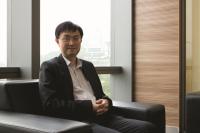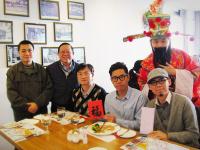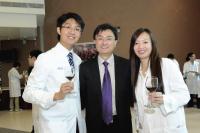1. Why do you study anatomy?
The human body structure has always intrigued me since childhood. When studying biology at the undergrad level, I was trying to explore my interests, and eventually for my research topic, I landed on the workings of the brain and its functions as well as related diseases. When I was still a biology undergrad, two of my younger female schoolmates died of cerebral hemorrhage. Their death taught me about the fragility of life, while inspiring my interest and determination in brain research, and I aspired to contribute to the best interests of patients for the rest of my life. That's why when I took up master's and doctoral programmes, I decided to become a graduate student in the Faculty of Medicine and burrow deep into the studies of anatomy and neuroscience, for my dream to come true.
2. What are your teaching goals?
As a student for so many years, I met different teachers and reflected on their teaching methods. When I was in a class, I would seriously consider why the teacher's lesson was so boring, and that was the time I would imagine: if I have a chance to teach the same topic in future, how can I bring life into the classroom and make things interesting so that it is easier for the students to understand? How is it possible to explain a complex concept for it to be clearly understood? The courses I teach include neuroanatomy, frankly speaking, when I was a student, there were some topics in neuroanatomy that I could not understand, it took me a while before I came to grip with those topics. So when I prepare a lesson, I will often read about the related topic again, then I will use what I understand to explain to students in a simple and easy way. My biggest aim in teaching is to enable students to fully grasp the focus of the topic, I do not want my explanation to stir up even more confusion. When students are able to appreciate the science and apply their knowledge, it will be great satisfaction for me.
3. What kind of impact do you think anatomy will have on students?
In the process of studying human anatomy, I have been deeply touched by the marvels of body structure. I wish to bring this cognitive knowledge to my students. I recalled during students' sharing after those anatomy experiments, they all agreed that this kind of learning helped consolidate the study of clinical knowledge in future, and they also discovered the wonders of the different parts of the body in that they are complementary to each other and not independent in functioning. Classroom learning helps students increase their knowledge, and what's more I hope my students will learn to respect and appreciate life. That is why before anatomy experiment sessions in every term, I will lead teachers and medical students to stand in silent tribute, paying homage to all our "silent teachers". This will let students understand that these bodies can serve as free learning medium because people contribute their own bodies for students to conduct experiment on. Students are expected to learn how to be thankful and even requite favour to the community. At the end of the term, students will write a thank you card to the "silent teacher" and send to the body donor's family for them to understand what these students learn in the anatomy experiment. I take it seriously in integrating the human element into anatomy classroom teaching. This is my set of educational philosophy and values.
4. Looking back into the years of teaching in CUHK, were there any challenges? How did you face them?
CUHK has been committed to the "Body Donation Scheme" to meet the needs of anatomy teaching. In fact, the biggest reason to implement the scheme is due to "shortage" (the need for adequate bodies for medical teaching). However, there was only lukewarm response to the scheme in the past. Still remember that close to September 2011, which was the beginning of teaching term, the Faculty of Medicine had not received any bodies for six months. Our inventory reached only half of the demand for teaching use, and there was absolutely no sign for adequate bodies to be received within a short period of time. The outlook was pretty grim. Without an adequate supply of bodies, students would not have enough opportunity to learn anatomy of the human body. I believed that as far as teaching was concerned, we owed it to the students. Then we turned to the media for our needs and media attention allowed the scheme to become widely promoted. My colleagues and I worked nonstop, attending various seminars to spread the message of body donation. For the last two years, I have noticed that there was very good response to the idea of body donation and the number of application forms we received every year for body donation increased from around twenty to more than 2,000. I am so grateful to my colleagues for their help.
5. How would you deal with stress?
I will try to classify the sources of stress, such as: Can such pressure be resolved with my efforts and that of my colleagues? Or will it be a long-term issue beyond our scope of control? If it is the former, just like the implementation of the "Body Donation Scheme", as long as I put in a little more thoughts, coupled with cooperative efforts among colleagues, I believe it can be done. However, for something which is beyond our control, such as upgrading the dissection room, adding laboratory equipment, etc., without funding nothing can be achieved, in which case I will not unduly interfere. By not interfering, I mean we will not press on. My colleagues and I will first carry out preparatory work, and wait for the right opportunity to arrive before taking decisive actions. I believe that we should not take things for granted, as resources are limited, we should take account of the needs of other departments even more so. When you always approach your work and people around you with open-mindedness and sobriety, the pressure will not bring any negative emotions to you.
6. How would you describe your relationship between colleagues?
We all share the same goal, we want to do the best job for anatomy work in the Faculty of Medicine, we also want to solve the long-term problem in the shortage of donated bodies. Through our teaching, we expect to educate a group of students about the meaning of gratitude. These ideas gradually build up within our team, and we are marching towards the same goal. Calculation is not an issue for my colleagues, a lot of publicity work, website creation, etc., for which there is no compensation, they still feel it is their bounden duty to work on them. As the person in charge, I've been thinking about how to repay the efforts of our colleagues. Therefore, support for my colleagues, both tangibly (in terms of making recommendations for training sponsorship or nomination for promotion, etc.) or intangibly (showing appreciation and encouragement), I will spare no effort. I hope my colleagues will feel that both the University and the Faculty of Medicine are positive about their contributions. The way they never calculate and to give it all with no regrets, this is indeed hard work and great service.
7. Do you have anything to say to other colleagues who are serving CUHK?
I think a good working relationship owes much to how we learn to respect each other, to understand the thoughts of others, and therefore, I always appreciate and thank my colleagues for their help. If we can develop a relationship based on mutual help and understanding and solve our problems in a peaceful and positive manner, we will be able to avoid a lot of misunderstanding and disputes.
I expect young colleagues in responsible positions will try to understand the opinions of coworkers of junior or senior rank, for these will be of great reference value. As a team, I hope that all staff members working in CUHK will share the same goal, be helpful to each other, always treat colleagues with a positive and caring attitude, and develop a working attitude seeking for continuous improvement and excellence. I hope we can do everything we can to make a contribution to the University, and to see it as our mission to improve the quality and standard of University services.













